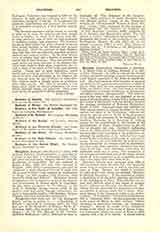

Brouwer (BROWERUS), CHRISTOPH, a historian, b. March 12, 1559, at Arnheim, Holland; d. in 1617, at Trier, Germany. In 1580 he entered the Society of Jesus, and after a thorough humanistic training, devoted himself especially to the study of church history. His attainments in other branches of learning are shown by his appointment as professor of philosophy at Trier; later he was appointed rector first at Fulda, and then at Trier. His chief work is entitled: “Antiquitates et annales Trevirenses et episcoporum Trevirensis ecclesiae suffraganorum”. The work extends to the year 1600 and was prepared at the request of two archbishops, Johann VII of Schbnenberg and Lothar of Mettermch, with the intent to disprove the partisan publication of Hermann (Kyriander), Syndic of Trier. Hermann’s work was published in 1576 and was written to support the claims of the city against the rights of the archbishop. Brouwer devoted the greater part of his life to the preparation of his book and, according to the testimony of the historian, Hontheim, he is deserving of undying honor for his contributions to the history of the Archbishopric of Trier. Unfortunately, he did not live to complete his task. Brouwer’s unflinching love of the truth and his true historical method were not agreeable to the councillors of the archbishop; so, although the publication of his work had been sane= tioned by the authorities of his order, it could not be issued. It was not until 1626 that the work of printing his manuscript at Cologne could be undertaken, and then only after important alterations had been made in the text. New difficulties arose when the eighteenth book was in press. The completion of the printing was forbidden and all the sheets already struck off were suppressed as far as possible, so that only a few copies have come down to us.
Brouwer’s labors were continued from 1600 to 1652 by Father Jacob Masenius, S.J., who issued the whole work in revised form in 1670 in two folio volumes at Liege. Brouwer was unable to complete his other great work, which was entitled: “Metropolis Ecclesiae Trevericie”. It was intended to contain a description of all the cities, churches, and cloisters of the Archdiocese of Trier. This work did not appear until 1855-56 when it was issued at Coblenz in two volumes by Christian von Stramberg. The edition does not meet fully the demands of our time, nevertheless it contains much that is useful. Brouwer’s history of the Diocese of Fulda is also worthy of praise. It is entitled: “Fuldensium antiquitatum libri 4” (Antwerp, 1612). Of less importance is the work issued at Mainz in 1616, entitled: “Sidera illustrium et sanctorum virorum, qui Germaniam ornarunt”. Among the results of his humanistic studies is the edition of the works of Bishop Venantius Fortunatus, which was issued at Mainz in 1603, together with a life of St. Martin. A second edition appeared in 1617 augmented by the annotated poems of Archbishop Rhabanus Maurus.
PATRICIUS SCHLAGER

